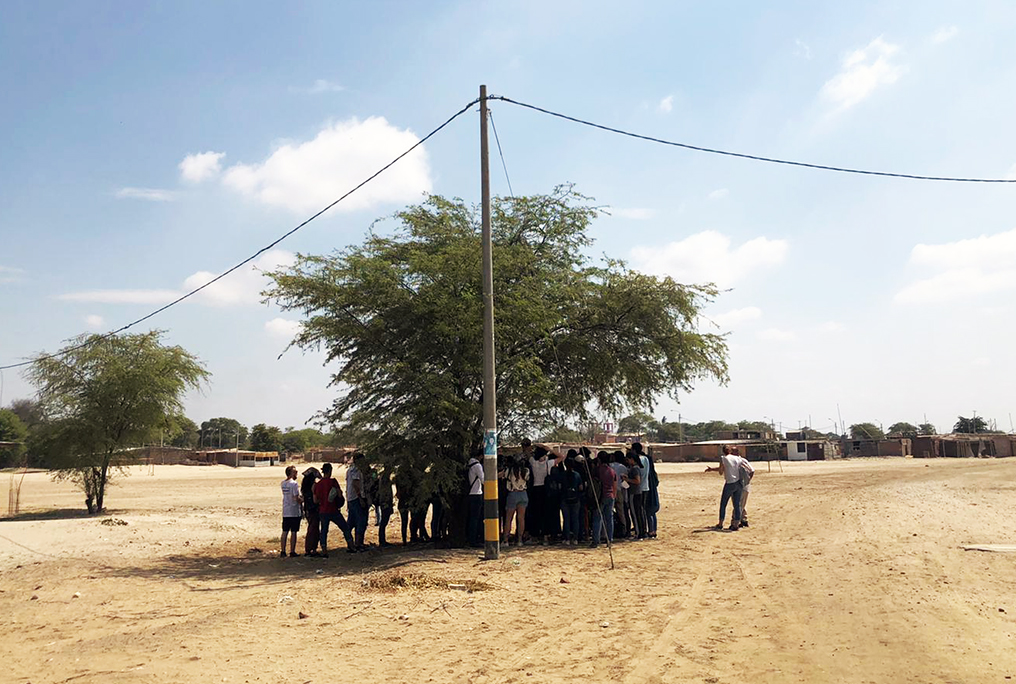 Last week, our students embarked on their journey to Peru for our annual field trip. Together with our director Carmen Mendoza Arroyo and assistant director Raquel Colacios, they arrived in Pedregal, Piura, to work on Integrated nature-based solutions for post-disaster recovery through public space design.
Last week, our students embarked on their journey to Peru for our annual field trip. Together with our director Carmen Mendoza Arroyo and assistant director Raquel Colacios, they arrived in Pedregal, Piura, to work on Integrated nature-based solutions for post-disaster recovery through public space design.
 THE CONTEXT OF THE WORKSHOP
THE CONTEXT OF THE WORKSHOP
In March 2017, the natural phenomenon known as ‘El Niño costero’ caused intense rains, floods and disasters – mainly due to lack of planning – along all of the Peruvian coast and especially in Piura, where the river again flooded the city. More than 3000 people lost their homes. One of the most affected areas was El Pedregal. Three years later, the population of this area is still waiting for the government of Perú to solve their housing problem. A plan by the central government of Perú and the Municipality of Piura is currently in work, and public funds have been allocated by the “Reconstrucción con Cambios” authority, dealing with the reconstruction at national level.

 Pedregal
Pedregal
THE OBJECTIVE
The workshop is conducted in collaboration with our local partner, the Universidad de Piura, and our alumni Rossana Poblet. The work contributes to the reconstruction plan of the area with specific strategies for the improvement and design of open spaces and children play areas. The objective is to develop a pilot project in an allocated open space area that includes a conceptual study at a landscape scale, a detailed analysis at a neighbourhood scale, the elaboration of a participatory process with the objective of creating a Memory Park for Pedregal, Piura, and the construction of the first phase of the park and children’s play area. During this workshop, our students are teaming up with local students from the Universidad de Piura and, as in previous years, from RMIT University, as well as local NGO’s.
 Our directors with Stella Schroeder from the Universidad de Piura and Rossana Poblet
Our directors with Stella Schroeder from the Universidad de Piura and Rossana Poblet
Our students have previously undertaken an analysis of the ecological grid and open space territorial system; mobility, transportation and accessibility; typology and morphology; activities and zones; as well as a socio-economic analysis.
 Prototype house built by the women of a risk prevention group in collaboration with the NGO CARE
Prototype house built by the women of a risk prevention group in collaboration with the NGO CARE
 Community evaluation risk map developed by the community of Catacao, in collaboration with CARE
Community evaluation risk map developed by the community of Catacao, in collaboration with CARE
THE METHODOLOGY
To develop an integrated (from void to urban fabric) and social diagnosis in order to deliver specific regenerative proposals and a design for the park, the methodology of the workshop is organised in four steps:
- the initial physical assessment of the project site to identify what conditions should be reinforced and improved;
- a social approach that incorporates the results and recommendations already developed by local institutions and colaborators regarding the community’s perception regarding housing, open spaces and socio-economic conditions of the area, including the conduction of interviews with local stakeholders, NGO’s and local residents;
- the socio-spatial integration of the data collected and development of strategic proposals, in order to bridge the physical and socially based findings;
- the joint urban betterment proposal of the park.
 While our students work with the local residents in Peru rebuilding their communities, we see an increase in climate change related disasters and extreme weather events. In a recent blog post, we mentioned the climate crisis as one of the most pressing current challenges that shaped our program. The adaptation to the effects of climate change and the increased frequency and intensity of flooding and droughts are often perceived as issues affecting primarily countries in the Global South. Yet just in these past days, storm Gloria has ravaged the Catalan coast and large parts of Spain, completely inundating the Ebro Delta, flooding towns and eroding beaches, in a meteorological event that has stunned locals due to its ferocity. Increasing the awareness in young professionals by working on urgent emergency topics such as climate change, environmental justice and resilience, is one of the core issues of our program.
While our students work with the local residents in Peru rebuilding their communities, we see an increase in climate change related disasters and extreme weather events. In a recent blog post, we mentioned the climate crisis as one of the most pressing current challenges that shaped our program. The adaptation to the effects of climate change and the increased frequency and intensity of flooding and droughts are often perceived as issues affecting primarily countries in the Global South. Yet just in these past days, storm Gloria has ravaged the Catalan coast and large parts of Spain, completely inundating the Ebro Delta, flooding towns and eroding beaches, in a meteorological event that has stunned locals due to its ferocity. Increasing the awareness in young professionals by working on urgent emergency topics such as climate change, environmental justice and resilience, is one of the core issues of our program.
For photos and stories about the workshop, follow us on Instagram.
Images: Carmen Mendoza Arroyo, Raquel Colacios, Gad Abdelmoneim

